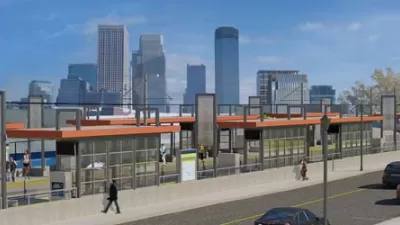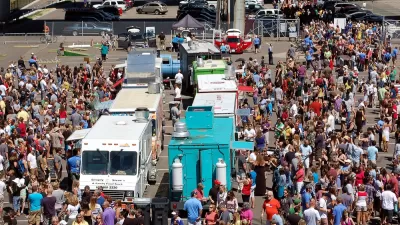In a familiar refrain for anyone who's lamented the veto power of NIMBYs or the added cost of citizen engagement events, one writer expresses concerned about a recent succession of developments shot down by community groups in the Twin Cities.
Marlys Harris is concerned about a number of proposed projects that have come under fire, and were subsequently killed or indefinitely delayed, by neighborhood groups in the Minneapolis area. The "mother of all" projects to recently suffer the ire of neighborhood groups, according to Harris, is the Southwest LRT. Says Harris: "The objections of local groups both in Minneapolis and St. Louis Park to various aspects of the route have forced the Met Council into proposing a fix that would raise the cost of the line by about $140 million to $150 million. Even so, they are unappeased, and a major piece of the region’s future transportation network is now teetering on the edge of a cliff."
Harris then goes on to provide a primer on "advocacy planning" as espoused by Paul Davidoff, who founded the urban affairs program at Hunter College in New York City (and which Harris attended) by discussing the defeat of the South Richmond Plan, which called for the massive redevelopment of Staten Island, at the hands of neighborhood advocates.
The lesson Harris learned at the time, and is sharing with Minneapolis at this moment: "So much for the wisdom of local interests. For a brief moment, they had an opportunity to shape a plan that could have provided continuing vitality to their neighborhoods, the city and the entire region. But they let it drop, and they're now paying a steep price."
FULL STORY: Citizen participation: blessing turned curse?

Planetizen Federal Action Tracker
A weekly monitor of how Trump’s orders and actions are impacting planners and planning in America.

Map: Where Senate Republicans Want to Sell Your Public Lands
For public land advocates, the Senate Republicans’ proposal to sell millions of acres of public land in the West is “the biggest fight of their careers.”

Restaurant Patios Were a Pandemic Win — Why Were They so Hard to Keep?
Social distancing requirements and changes in travel patterns prompted cities to pilot new uses for street and sidewalk space. Then it got complicated.

Platform Pilsner: Vancouver Transit Agency Releases... a Beer?
TransLink will receive a portion of every sale of the four-pack.

Toronto Weighs Cheaper Transit, Parking Hikes for Major Events
Special event rates would take effect during large festivals, sports games and concerts to ‘discourage driving, manage congestion and free up space for transit.”

Berlin to Consider Car-Free Zone Larger Than Manhattan
The area bound by the 22-mile Ringbahn would still allow 12 uses of a private automobile per year per person, and several other exemptions.
Urban Design for Planners 1: Software Tools
This six-course series explores essential urban design concepts using open source software and equips planners with the tools they need to participate fully in the urban design process.
Planning for Universal Design
Learn the tools for implementing Universal Design in planning regulations.
Heyer Gruel & Associates PA
JM Goldson LLC
Custer County Colorado
City of Camden Redevelopment Agency
City of Astoria
Transportation Research & Education Center (TREC) at Portland State University
Camden Redevelopment Agency
City of Claremont
Municipality of Princeton (NJ)




























